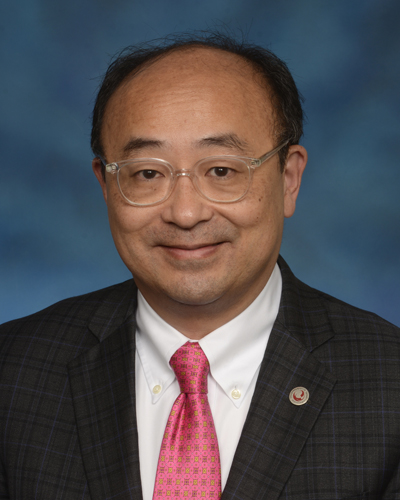June 13, 2018

Top Cardiovascular Medicine Specialist, Charles Hong, MD, PhD, Joins UMSOM
Stephen Davis, MBBS, FRCP, FACE, MACP, The Theodore E. Woodward Professor of Medicine and Chairman of the Department of Medicine at the University of Maryland School of Medicine (UMSOM), named Charles C. Hong, MD, PhD, FAHA, the Melvin Sharoky Professor of Medicine, Director of Research and Associate Chief of the Cardiology Division.
His appointment is part of UMSOM’s Special Trans-Disciplinary Recruitment Award Program (STRAP), a program launched in 2016 to recruit top physicians and scientists.
“The Department of Medicine is delighted to have Chaz Hong join our team in Cardiology. Dr. Hong’s appointment represents an opportunity to develop a distinguished cardiology research section. He has an exceptional track record as a physician-scientist and will be an outstanding colleague and mentor in our Department and School,” said Dr. Davis.
Dr. Davis made the announcement in conjunction with University of Maryland School of Medicine Dean E. Albert Reece, MD, PhD, MBA, who is also University Executive Vice President for Medical Affairs and the John Z. and Akiko K. Bowers Distinguished Professor.
“Dr. Hong’s work brings together biology, stem cell biology and cardiovascular medicine with the potential to save thousands of lives. We are extremely excited that he is now part of our expanding stable of internationally renowned scientists,” said Dean Reece, who is also the University Executive Vice President for Medical Affairs and the John Z. and Akiko K. Bowers Distinguished Professor.
Dr. Hong, whose lab will be located in the newly opened Health Sciences Research Facility, comes to UMSOM from the Vanderbilt University School of Medicine, where he was associate professor of medicine, pharmacology and cell and developmental biology.
His research functions at the intersection of developmental biology, chemical biology, stem cell biology, and cardiovascular medicine. Dr. Hong’s work includes innovative chemical biologic approaches to study embryonic development as well as implementation of the induced pluripotent stem cell (iPSC) technology to better understand human cardiac muscle cell (cardiomyocyte) biology and pathobiology at the cellular level.
His research has made important contributions to the emerging field of chemical genetics through the discovery of chemical modulators of several key developmental pathways, including the first small molecule inhibitor of bone morphogenetic protein (BMP). Dr. Hong’s research has revealed both novel biological insights and new therapeutic opportunities. For example, his BMP inhibitor technology has been licensed to La Jolla Pharmaceutical Company (LJPC) for clinical development for treatment of devastating certain orphan diseases, as well as common diseases. In addition, Dr. Hong edited one of the first books focused on the role of chemical biology in stem cell and regenerative medicine, and a book covering the latest methods and protocols in chemical biology. His research has also made important contributions toward the utilization of human iPSC-derived cardiomyocytes (hiPSC-CMs) as an in vitro model for the study of human cardiomyocyte physiology. His clinical expertise is in cardiovascular genetics, inherited cardiomyopathies and echocardiography.
Dr. Hong received an MD as well as a PhD in genetics and medicine from the Yale School of Medicine. He completed his residency at Yale and his fellowship at Massachusetts General Hospital in Boston. He received a BS in life sciences from the Massachusetts Institute of Technology.
About the University of Maryland School of Medicine
The University of Maryland School of Medicine was chartered in 1807 and is the first public medical school in the United States and continues today as an innovative leader in accelerating innovation and discovery in medicine. The School of Medicine is the founding school of the University of Maryland and is an integral part of the 11-campus University System of Maryland. Located on the University of Maryland’s Baltimore campus, the School of Medicine works closely with the University of Maryland Medical Center to provide a research-intensive, academic and clinically based education. With 43 academic departments, centers and institutes and a faculty of more than 3,000 physicians and research scientists plus more than $400 million in extramural funding, the School is regarded as one of the leading biomedical research institutions in the U.S. with top-tier faculty and programs in cancer, brain science, surgery and transplantation, trauma and emergency medicine, vaccine development and human genomics, among other centers of excellence. The School is not only concerned with the health of the citizens of Maryland and the nation, but also has a global vision, with research and treatment facilities in more than 30 countries around the world. For more information, visit www.medschool.umaryland.edu.
Contact
Office of Public Affairs
655 West Baltimore Street
Bressler Research Building 14-002
Baltimore, Maryland 21201-1559
Contact Media Relations
(410) 706-5260
